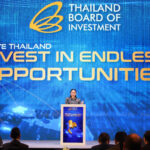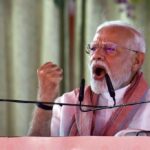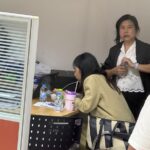In a world increasingly divided by ideological rifts and societal polarisation, Paul-Gordon Chandler has quietly carved out a gentler path—one paved not by politics or religion, but by art.
As the president and founder of CARAVAN, the international non-profit harnessing the arts to build bridges between diverse cultures, peoples and faiths, Chandler has reshaped what diplomacy can look like in our time—no speeches, no podiums, just powerful, shared visual expression.
His belief in the arts as a universal language traces back to his childhood in Senegal, where, as he puts it, “I grew up in one of the most artistic and creative cultures in the world—from visual arts to music, literature, poetry, film, dance.” That early immersion left a lasting imprint, one that would shape his life’s work: using beauty to foster belonging across boundaries.
An interfaith peacemaker and Anglican clergyman, Chandler is no stranger to cultural complexities. His years spent living in Egypt, Tunisia, Qatar, and working throughout the Middle East informed a worldview grounded in cultural diversity. Yet it wasn’t until 2009, while serving in Cairo, that Chandler saw the need for a radically different approach to bridge-building.
“We realised that traditional models weren’t reaching the average person,” Chandler has said of the early days of CARAVAN. Interfaith conferences and dialogue forums, while meaningful, often drew the same faces. “We needed something more universal. Something accessible. Something that would reach people on a deeper emotional level.” That “something” turned out to be art.
The first CARAVAN exhibition, held inside a historic church in Cairo, invited both premier Middle Eastern and Western artists to share works exploring common values. It was a bold concept—especially in a region where faith lines often run deep. Yet with support from prominent Muslim clerics, the show launched to a packed crowd, exceeding expectations. What Chandler witnessed was what he would later call “a deep hunger for connection through creative means.”
Collaborative creativity
Since then, CARAVAN’s exhibitions have become global in scope. They’ve addressed urgent themes such as religious diversity, identity, gender equality, environmentalism, and belonging—all through collaborative creative initiatives between artists from different backgrounds. And while the subject matter can at times be quite sensitive, the organization’s tone remains deliberately gentle, welcoming and all-embracing.
“We don’t lecture,” Chandler has said. “We exhibit. And in that space of presentation, people engage—and even transform.”
The art itself becomes the mediator. Painting, sculpture, photography, and installation carry messages that transcend language, cultural and political framing. The goal isn’t to push a specific point of view, but rather to curate a shared space of openness and reflection. In an age of outrage and ideological fatigue, CARAVAN offers a softer alternative: dialogue without words.
Paul-Gordon Chandler’s Philosophy
Chandler’s philosophy also finds voice in his writing. In his book In Search of a Prophet, a spiritual journey through the life of Kahlil Gibran, Chandler draws on the poet-artist’s legacy as a bridge-builder.
He describes Gibran as “a celebrated mystic who sought to build bridges and tear down walls and who remains a universal inspiration for us all.” That spirit—equal parts poet and peacemaker—resonates with Chandler’s mission.
It’s a mission that hasn’t gone unnoticed. In 2020, Chandler was awarded the Hubert Walter Award for Reconciliation and Interfaith Cooperation by the Archbishop of Canterbury—one of the Anglican Communion’s highest honors. It was a public recognition of work that is often quiet, but deeply impactful.
Even as CARAVAN continues to expand its reach, Chandler remains grounded in the idea that connection begins at the personal level. “The arts invite us into someone else’s story,” he has said. “And once you enter that story, it’s harder to stay divided.”
In a time when shouting often drowns out listening, Chandler’s model of cultural diplomacy reminds us that it’s still possible to lead with imagination and beauty. Through CARAVAN, he offers the world not just a visual gallery, but a living archive of dialogue, trust, and hope.
Art, he believes, speaks first. And when it does, connection follows.
Related News:
Attacks on Christians in India Continue to Escalate
The opinions or information expressed in this press release are solely those of the authors and do not necessarily reflect the views of the Chiang Rai Times. For more information on our sponsored content policy Click Here














